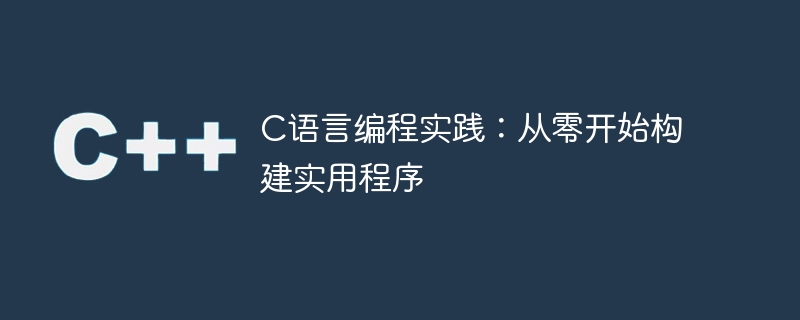

C programming language has always been the foundation of computer science learning. Its simplicity and efficiency make it the language of choice for many program developers. In this article, we will introduce the process of building a utility program from scratch to help beginners better practice C language programming.
Before we start building utility programs, we need to have a clear understanding of the basic concepts and syntax of C language. The syntax of C language is relatively simple, so beginners only need to master a few basic elements to start writing programs. For example, learn about variables, data types, operators, control flow statements, functions, etc.
In addition, beginners also need to understand some programming specifications and conventions of C language, such as variable naming rules, function naming rules, etc. These specifications and conventions can help us write clearer and more readable code.
Before practicing C language programming, we need to choose a development environment that suits us. Common C language development environments include: Code::Blocks, Dev-C, Visual Studio, etc.
After choosing a suitable development environment, we need to learn how to create new C language projects and source files, and how to compile and run our programs. These basic development environment operations are the basis for our C language programming practice.
Before we start writing program code, we need to design the structure and function of the program. This requires us to have a clear understanding of the program's requirements, and then design the program's modules and functions based on the requirements.
When designing the program structure, we should try our best to follow the principles of modularity and reusability. Decompose the program into different modules and functions, each module and function is only responsible for completing a specific function. This can make the structure of the program clearer and make it easier to maintain and expand.
After we design the program structure, we can start writing program code. When writing code, we should follow good coding habits, such as indentation, comments, and naming conventions. This makes our code more readable and understandable.
In the process of writing code, we need to debug and test. Debugging means finding errors and problems in program code and fixing them. Testing refers to testing the input values of the program code to ensure that the program runs as expected.
During the debugging and testing process, we can use some debugging tools and techniques, such as using breakpoints to track the execution process of the program, using output statements to view the values of variables, etc. These tools and tips can help us find problems faster and fix them.
In addition to writing and debugging program code, we must also pay attention to program performance issues. Optimizing program performance can make the program more efficient and improve the execution speed and resource utilization of the program.
When optimizing program performance, we can adopt some common optimization strategies, such as reducing redundant calculations, reducing memory usage, and using efficient algorithms and data structures. These optimization strategies can improve program performance to a certain extent.
Through this article, we learned about the process of building a utility from scratch. First, we need to understand the basic concepts and syntax of C language. Then, choose a C language development environment that suits you and learn basic development environment operations. Next, design the structure and function of the program, write and debug the program code. Finally, optimize program performance and improve program execution efficiency.
Through continuous practice and learning, we can gradually improve our C language programming practice capabilities and write more practical and efficient programs. I hope this article will be helpful to beginners and allow them to better practice C language programming.
The above is the detailed content of Learn how to develop utility programs from scratch using C. For more information, please follow other related articles on the PHP Chinese website!




